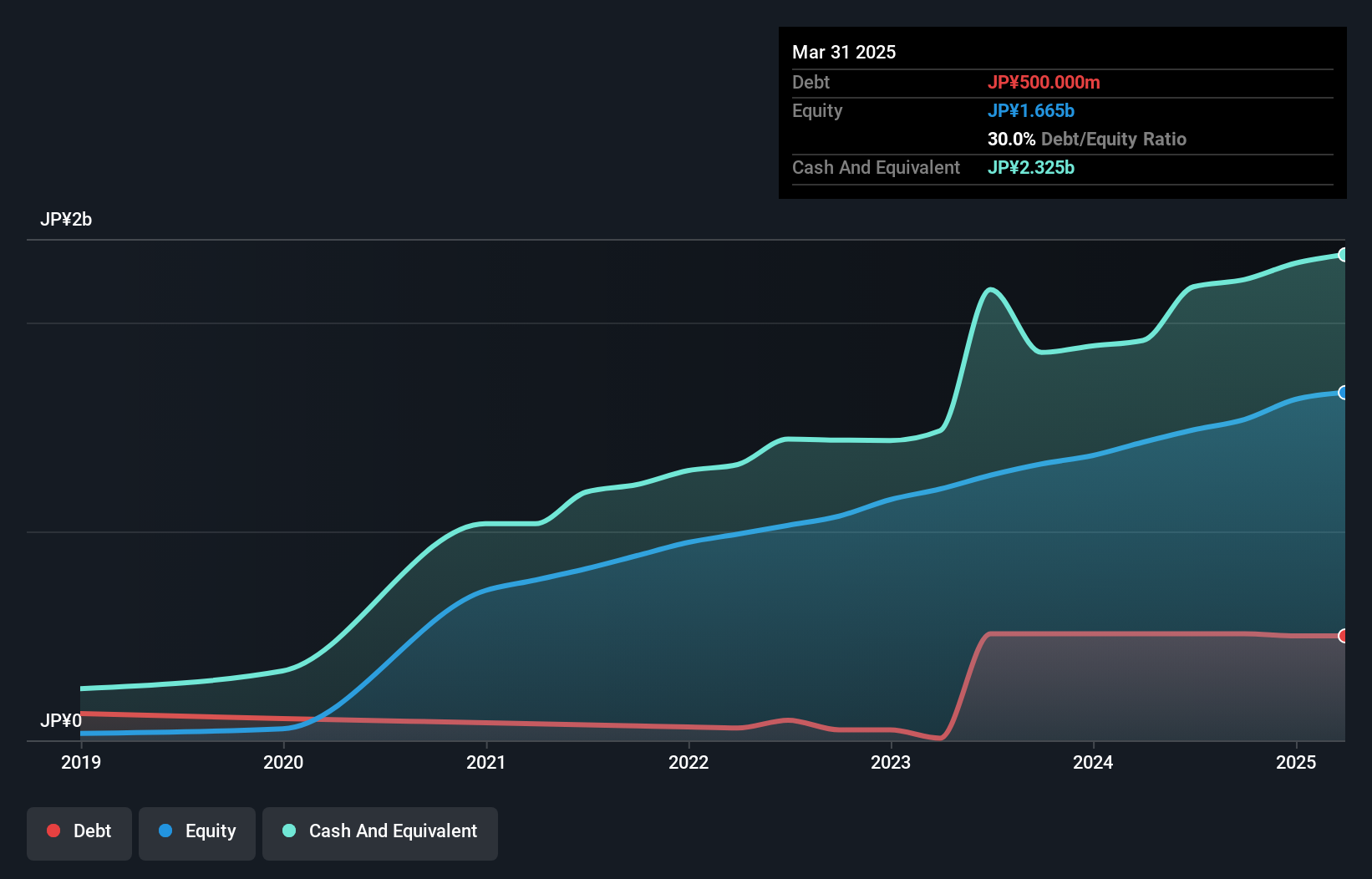The external fund manager backed by Berkshire Hathaway's Charlie Munger, Li Lu, makes no bones about it when he says 'The biggest investment risk is not the volatility of prices, but whether you will suffer a permanent loss of capital.' When we think about how risky a company is, we always like to look at its use of debt, since debt overload can lead to ruin. We can see that rakumo Inc. (TSE:4060) does use debt in its business. But the real question is whether this debt is making the company risky.
What Risk Does Debt Bring?
Debt assists a business until the business has trouble paying it off, either with new capital or with free cash flow. If things get really bad, the lenders can take control of the business. However, a more common (but still painful) scenario is that it has to raise new equity capital at a low price, thus permanently diluting shareholders. Of course, the upside of debt is that it often represents cheap capital, especially when it replaces dilution in a company with the ability to reinvest at high rates of return. The first step when considering a company's debt levels is to consider its cash and debt together.
What Is rakumo's Net Debt?
As you can see below, rakumo had JP¥500.0m of debt, at March 2025, which is about the same as the year before. You can click the chart for greater detail. But on the other hand it also has JP¥2.33b in cash, leading to a JP¥1.83b net cash position.

How Strong Is rakumo's Balance Sheet?
According to the last reported balance sheet, rakumo had liabilities of JP¥832.0m due within 12 months, and liabilities of JP¥579.0m due beyond 12 months. Offsetting these obligations, it had cash of JP¥2.33b as well as receivables valued at JP¥46.0m due within 12 months. So it actually has JP¥960.0m more liquid assets than total liabilities.
This excess liquidity suggests that rakumo is taking a careful approach to debt. Due to its strong net asset position, it is not likely to face issues with its lenders. Succinctly put, rakumo boasts net cash, so it's fair to say it does not have a heavy debt load!
Check out our latest analysis for rakumo
Another good sign is that rakumo has been able to increase its EBIT by 25% in twelve months, making it easier to pay down debt. When analysing debt levels, the balance sheet is the obvious place to start. But it is rakumo's earnings that will influence how the balance sheet holds up in the future. So if you're keen to discover more about its earnings, it might be worth checking out this graph of its long term earnings trend.
Finally, while the tax-man may adore accounting profits, lenders only accept cold hard cash. While rakumo has net cash on its balance sheet, it's still worth taking a look at its ability to convert earnings before interest and tax (EBIT) to free cash flow, to help us understand how quickly it is building (or eroding) that cash balance. Over the last three years, rakumo recorded free cash flow worth a fulsome 98% of its EBIT, which is stronger than we'd usually expect. That positions it well to pay down debt if desirable to do so.
Summing Up
While we empathize with investors who find debt concerning, you should keep in mind that rakumo has net cash of JP¥1.83b, as well as more liquid assets than liabilities. The cherry on top was that in converted 98% of that EBIT to free cash flow, bringing in JP¥398m. So we don't think rakumo's use of debt is risky. There's no doubt that we learn most about debt from the balance sheet. But ultimately, every company can contain risks that exist outside of the balance sheet. For example - rakumo has 1 warning sign we think you should be aware of.
If you're interested in investing in businesses that can grow profits without the burden of debt, then check out this free list of growing businesses that have net cash on the balance sheet.
Valuation is complex, but we're here to simplify it.
Discover if rakumo might be undervalued or overvalued with our detailed analysis, featuring fair value estimates, potential risks, dividends, insider trades, and its financial condition.
Access Free AnalysisHave feedback on this article? Concerned about the content? Get in touch with us directly. Alternatively, email editorial-team (at) simplywallst.com.
This article by Simply Wall St is general in nature. We provide commentary based on historical data and analyst forecasts only using an unbiased methodology and our articles are not intended to be financial advice. It does not constitute a recommendation to buy or sell any stock, and does not take account of your objectives, or your financial situation. We aim to bring you long-term focused analysis driven by fundamental data. Note that our analysis may not factor in the latest price-sensitive company announcements or qualitative material. Simply Wall St has no position in any stocks mentioned.
About TSE:4060
Solid track record with adequate balance sheet.
Market Insights
Community Narratives




